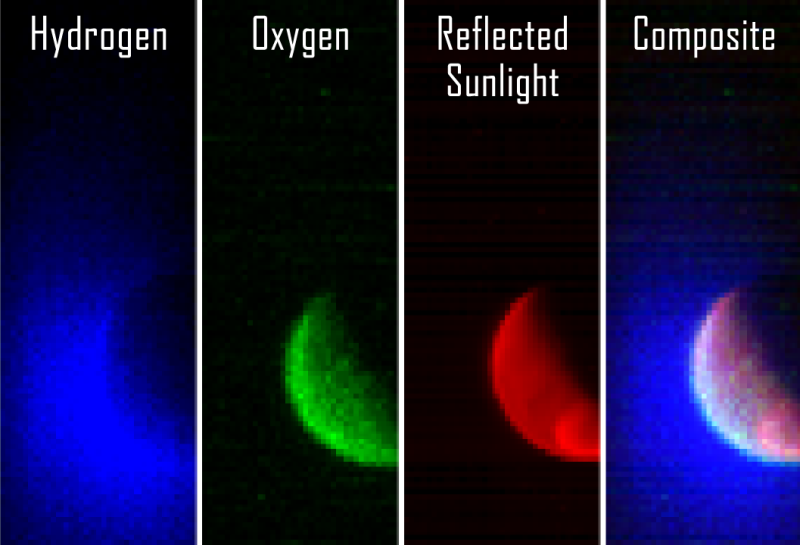Explanation: Launched on November 18, 2013, the MAVEN (Mars Atmosphere and Volatile EvolutioN) spacecraft completed its interplanetary voyage September 21, captured into a wide, elliptical orbit around Mars. MAVEN's imaging ultraviolet spectrograph has already begun its planned exploration of the Red Planet's upper atmosphere, acquiring this image data from an altitude of 36,500 kilometers. In false color, the three ultraviolet wavelength bands show light reflected from atomic hydrogen (in blue), atomic oxygen (in green) and the planet's surface (in red). Low mass atomic hydrogen is seen to extend thousands of kilometers into space, with the cloud of more massive oxygen atoms held closer by Mars' gravity. Both are by products of the breakdown of water and carbon dioxide in Mars' atmosphere and the MAVEN data can be used to determine the rate of water loss over time. In fact, MAVEN is the first mission dedicated to exploring Mars' tenuous upper atmosphere, ionosphere and interactions with the Sun and solar wind. But the most recent addition to the fleet of spacecraft from planet Earth now in martian orbit is MOM.
1999 2000 2001 2002 2003 2004 2005 2006 2007 2008 2009 2010 2011 2012 2013 2014 2015 2016 2017 2018 2019 2020 2021 2022 2023 2024 2025 |
Yanvar' Fevral' Mart Aprel' Mai Iyun' Iyul' Avgust Sentyabr' Oktyabr' Noyabr' Dekabr' |
NASA Web Site Statements, Warnings, and Disclaimers
NASA Official: Jay Norris. Specific rights apply.
A service of: LHEA at NASA / GSFC
& Michigan Tech. U.
|
Publikacii s klyuchevymi slovami:
Mars - Mars - atmosfera
Publikacii so slovami: Mars - Mars - atmosfera | |
Sm. takzhe:
Vse publikacii na tu zhe temu >> | |
